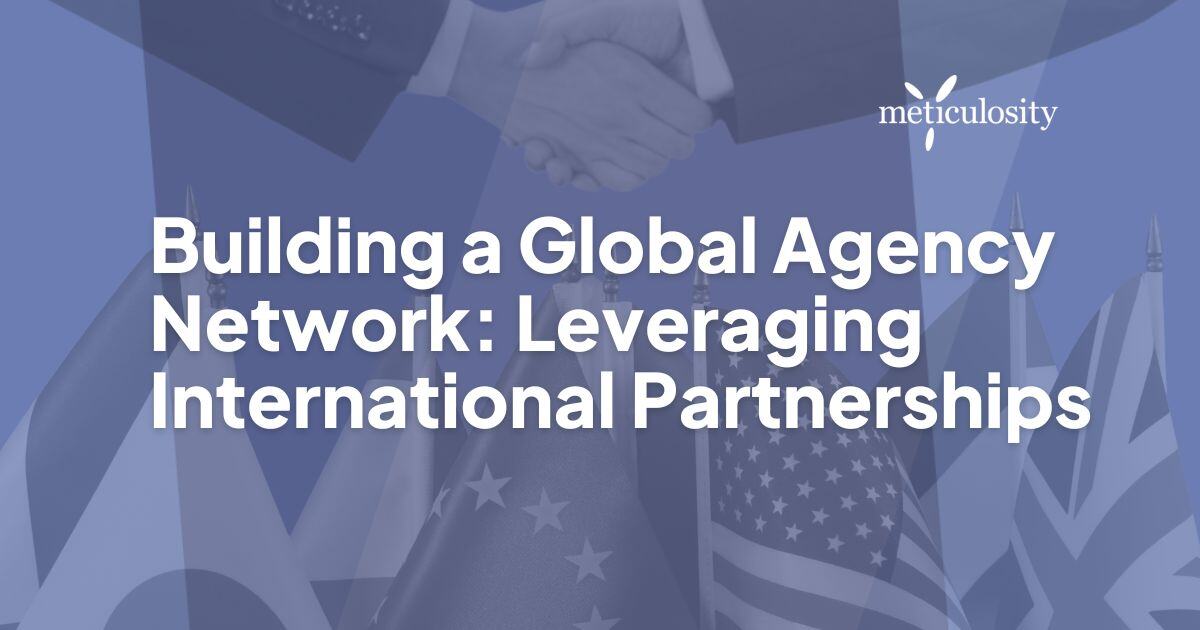In an increasingly interconnected world, agencies looking to scale must think beyond their local markets. International partnerships provide a gateway to new opportunities, enabling agencies to expand their reach, enhance their capabilities, and stay competitive in the global landscape. By forming a global network, agencies can tap into diverse resources, share knowledge, and access new clients while maintaining operational efficiency.
Building a successful international agency network requires strategic planning, research, and collaboration. This guide will walk you through the essential steps to establish and leverage global partnerships effectively.
Ready to expand your agency's global reach? Learn how our expertise can help: Meticulosity's Agency Services.
Understanding the Need for a Global Network
Market Expansion
Expanding into new markets allows agencies to increase their customer base and revenue streams. By partnering with international agencies, businesses can overcome geographical barriers, navigate foreign regulations, and establish a presence in regions that would otherwise be challenging to enter independently.
Resource Sharing
International partnerships enable agencies to pool expertise, technology, and resources. Whether it's content creation, PPC management, or CRM implementation, collaborating with global partners allows agencies to enhance their service offerings and provide more comprehensive solutions to clients.
Cultural Insights
Understanding local markets is critical to delivering impactful marketing campaigns. Partnering with agencies familiar with specific regional audiences provides invaluable cultural insights, helping businesses tailor their messaging, branding, and overall strategy to better resonate with their target markets.
Identifying Potential Partners
Research and Analysis
Finding the right international partner requires thorough research. Agencies should assess potential partners based on their industry expertise, reputation, and past performance. Reviewing case studies, client testimonials, and online presence can provide valuable insights into an agency’s capabilities.

Complementary Strengths
A strong partnership is built on complementary skills. Agencies should seek partners who offer expertise in areas where they may need support. For example, an agency specializing in inbound marketing may benefit from partnering with a PPC-focused firm to provide full-funnel solutions to clients.
Cultural Compatibility
Successful partnerships thrive on mutual understanding and shared values. Cultural differences in communication styles, decision-making, and business ethics should be evaluated to ensure seamless collaboration. Engaging in preliminary discussions and small pilot projects can help assess compatibility before committing to a long-term partnership.
Strategies for Building International Partnerships
Networking Events
Industry conferences, trade shows, and webinars are excellent opportunities to connect with potential partners. Events like HubSpot’s INBOUND, Cannes Lions, and regional digital marketing expos provide platforms to establish relationships with agencies across the globe.
Online Communities
Professional networks such as LinkedIn, Slack groups, and industry-specific forums allow agencies to engage with like-minded professionals and explore potential collaborations. Actively participating in discussions and sharing valuable insights can position agencies as attractive partnership prospects.

Professional Associations
Joining global networks like Worldwide Partners, The Network One, and Agency Management Institute provides access to an extensive list of vetted agencies. These associations facilitate introductions, collaboration opportunities, and shared resources among their members.
Establishing Effective Communication
Open Dialogue
Transparent communication is the foundation of a strong partnership. Clearly outlining expectations, goals, and workflows helps prevent misunderstandings and ensures alignment on key objectives.
Regular Updates
Consistent check-ins via video calls, emails, or project management platforms help keep partnerships on track. Establishing a regular cadence for updates ensures that both parties remain informed about progress, challenges, and upcoming opportunities.
Leveraging Technology
Utilizing tools like Slack, Asana, Monday.com, and Zoom facilitates seamless collaboration. Shared dashboards, task management systems, and real-time communication platforms help bridge time zone differences and streamline workflow coordination.
Creating Mutual Value
Setting Clear Goals
Defining shared objectives and KPIs at the outset of a partnership ensures both parties are working towards common success. Whether it's lead generation, revenue growth, or brand expansion, aligning expectations is crucial.
Collaborative Projects
Joint ventures such as co-branded campaigns, knowledge-sharing webinars, and cross-promotional marketing initiatives provide tangible benefits for both agencies. By leveraging each other’s expertise, partners can create innovative solutions that drive results.
Feedback Mechanisms
Implementing structured feedback loops helps refine and improve the partnership over time. Regular evaluations, surveys, and performance reviews allow agencies to address any challenges and optimize their collaboration strategies.
Conclusion
Expanding your agency’s reach through international partnerships can unlock immense growth opportunities. By carefully selecting partners, leveraging networking channels, and maintaining effective communication, agencies can build a robust global network that drives long-term success. Ready to take your agency global? Explore how we can help: Meticulosity's Agency Services.
Frequently Asked Questions
1. What are the benefits of building a global agency network?
A global network enhances market reach, provides access to diverse resources, and offers insights into local markets, making it easier to scale and innovate.
2. How can I identify potential international partners?
Conduct thorough research, analyze complementary strengths, and assess cultural compatibility to ensure a successful partnership.
3. What strategies can I use to build international partnerships?
Attend networking events, engage in online communities, and join professional associations to connect with potential partners.
4. How important is communication in international partnerships?
Effective communication is crucial for establishing trust, addressing concerns, and ensuring mutual goals are met in a partnership.
5. Can you provide examples of successful agency collaborations?
Yes, case studies show how agencies have successfully partnered to expand services, enter new markets, and enhance competitive advantages.







